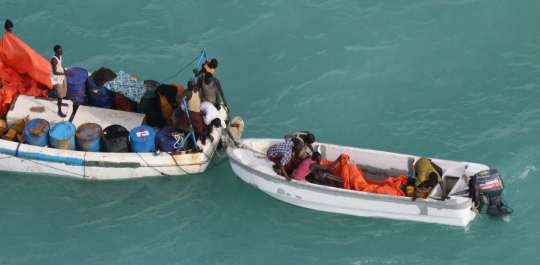Piracy: an “off shore” Somali tribunal would be the best option according to the EU

(BRUXELLES2) On the table of the 27 EU ambassadors on Tuesday was a recurring dossier on the fight against pirates in the Gulf of Aden and the Indian Ocean: what to do with (Somali) pirates once arrested?
The stakes are not small. But, paradoxically, the subject had not really been discussed for many months in this forum. While according to official figures, more than 700 suspects or proven pirates had to be released, in the first half of the year, by the international navies deployed in the Gulf and the Indian Ocean, for lack of a host country and an appropriate legal system (1 ). Today, only Kenya and the Seychelles, and soon Mauritius (1), agree to prosecute suspects arrested by European ships under agreements signed with the EU. Puntland does the same, but bilaterally or informally (2), while Yemen receives suspects but from other States.
Four options on the table...
The ambassadors had at their disposal a paper from the CMPD (the civil-military planning directorate of the EU) which envisaged four possible options, according to a simpler and more compact formulation than the 7 options of the UN paper presented by Ban Ki Moon (4):
- 1) a Somali jurisdiction, operating outside Somalia if necessary;
- 2) jurisdictions of states other than Somalia;
- 3) a regional court (based on the African Court of Human Rights or the East African Court of Justice or an ad hoc agreement);
- 4) an international jurisdiction (on the TpiY model).
The advantages and disadvantages of each solution have been carefully weighed by the experts and debated by the ambassadors. But the need for a rapid solution seems to prevail at European level.
Thus, solutions 3 and 4 require an international agreement or the modification of a pre-existing agreement. Which is " long, expensive and complex explains a European expert. They are therefore rather part of a vision to " long term » unrealistic in relation to the needs on the ground.
Solution 2 has the advantage of being part of an existing penal framework, of being able to be quickly implemented. It was advocated during the " workshop in the Seychelles in May. The Indian Ocean archipelago has even applied to host such a tribunal, provided that the detention is provided by another country; a law is in preparation allowing prisoners to be transferred to third countries (with respect for human rights). But this solution requires having more agreements than today and financial support is also necessary.
Advantages and difficulties of an "off shore" Somali tribunal
Solution 1 (which could be combined with solution 2), a Court established under Somali law in a third country and operating under Somali law. It has the advantage of legitimacy, a common language and legal simplicity of the appropriation ("ownership") by the Somalis, not to mention that of the continuity of action - so prized by jurists - between the arrest (Somali citizen), the judgment (judge and Somali law) and the 'imprisonment. An agreement could be reached quite easily with the TFG or/and the autonomous provinces of Puntland and Somaliland. This solution is also part of a continuum action by the international community: rehabilitation of courts in Garowe, Galakayo, Bossasso and Gardo (Puntland); construction of 4 new courts in the South-Central part of Somalia, training of judges and prosecutors of Puntland and Somaliland...
However, all difficulties are not ruled out: while draft legislation is in the process of being agreed between the TFG, Puntland and Somaliland, under the auspices of UNODC (the United Nations Office on Drugs and crime), there is no denying that three Somali parties now have a different judicial system. Moreover, no one hides it now, the TFG supported at arm's length by the international community is in total decay - "A patient on life supportsums up, in a lapidary formula (but which seems fair), a European diplomat. Financial assistance, the presence of external personnel (judges, clerks...) will also be necessary. To the point that the EU is also considering a new mission of the PeSDC, profiled "Justice", which would also be necessary in the case of the other solutions (particularly solution 2). Read here.
Lire:
(1) 700 pirates freed in the first half. Latest assessment… official
(2) Mauritius says yes to EU to bring pirates to justice
(3) Legal treatment of pirates: the French solution
(4) Ban Ki Moon's 7 Options for Bringing Pirates to Justice
(Nicolas Gros-Verheyde)
